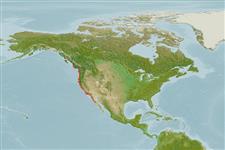Preferred temperature (Ref.
115969): 8.3 - 12.2, mean 9.7 (based on 80 cells).
Phylogenetic diversity index (Ref.
82804): PD
50 = 0.5000 [Uniqueness, from 0.5 = low to 2.0 = high].
Bayesian length-weight: a=0.00324 (0.00161 - 0.00648), b=3.18 (3.01 - 3.35), in cm Total Length, based on LWR estimates for this species & Genus-body shape (Ref.
93245).
Trophic level (Ref.
69278): 3.3 ±0.1 se; based on diet studies.
Daya lenting (Ref.
120179): sangat rendah, Waktu penggandaan populasi minimum lebih dari 14 tahun (tm=11-34; tmax=104).
Fishing Vulnerability (Ref.
59153): Very high vulnerability (87 of 100).
Climate Vulnerability (Ref.
125649): Moderate to high vulnerability (48 of 100).
